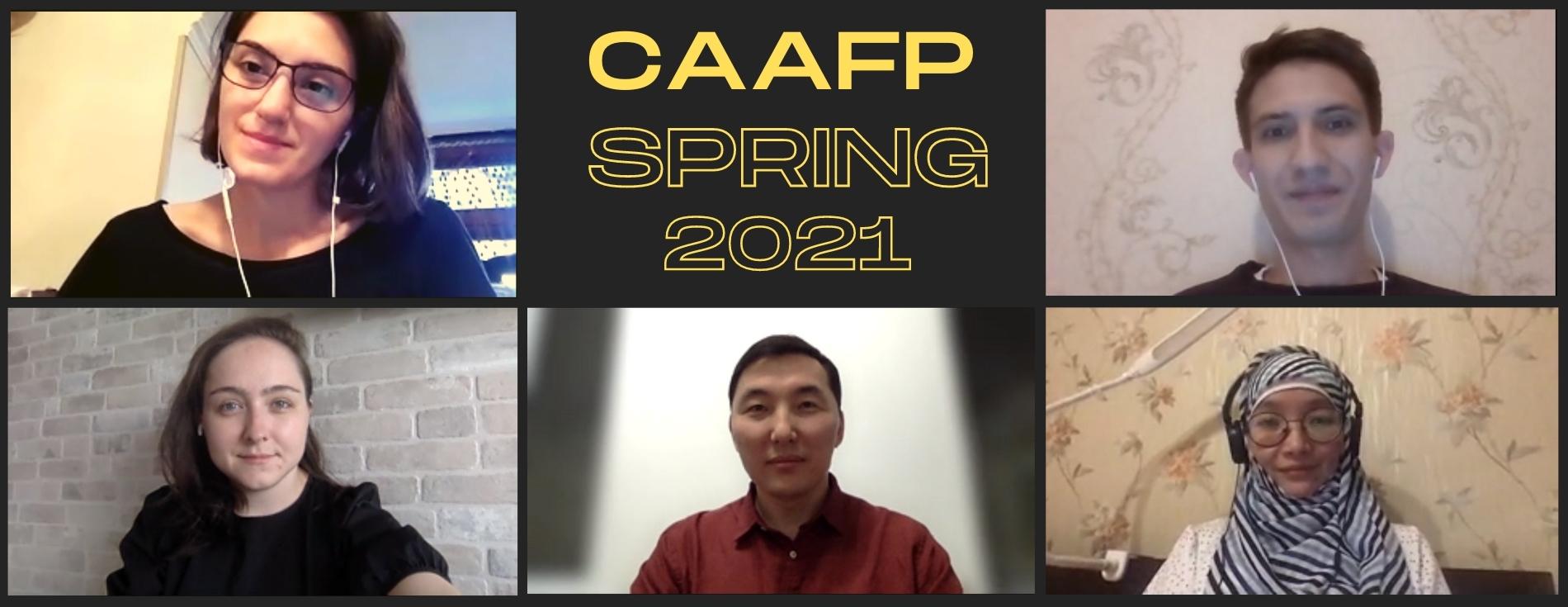Rising Civic Engagement in Central Asia and Azerbaijan
The Central Asia Program is proud to announce our Spring 2021 CAAFP Fellows’ Final Research Presentation. Join us for a brief seminar featuring our scholars from Azerbaijan, Turkmenistan, and Kazakhstan as they present their research on the current cultural, educational, environmental, and gender related issues in Central Asia.
Spring 2021 CAAFP Fellows and Their Research Topics
Violent Extremism and Youth: How to Build a Productive Dialogue Between Young People and Government
The paper analyzes current Kazakhstani policy for preventing violent extremism (PVE) and, based on the results of field research (a survey and focus groups with young people), suggests possible mechanisms and methods for improving PVE policy targeted at youth.
Anastassiya Reshetnyak holds a BA and MA in Area Studies from al-Farabi Kazakh National University (Almaty). She is currently a PhD student at L.N. Gumilev Eurasian National University (Nur-Sultan). Her research interests include the prevention of terrorism and violent extremism, societal security, and youth policy. She works at KazISS under the President of the Republic of Kazakhstan; she is also a part of PaperLab Research Group. Anastassiya has worked with UN institutions (UNDP, UNODC, IOM) as a national expert/consultant and participated in USAID projects on PVE.
Educated-Abroad Youth and the Advancement of Gender Equality in Turkmenistan: A Cog in the Machine or a Game Changer?
The study explores the potential of youth educated abroad, particularly in Belarus and Russia, to become socially engaged in addressing gender inequality upon their return to Turkmenistan. The issue of gender equality provides an important lens for measuring the civic maturity of this group and its interest in—and commitment to—positive progressive change. The study explores these students’ motivation to get involved in addressing these issues, investigates their gender perceptions, and evaluates the extent to which their experiences studying and living abroad have contributed to their understanding of their own social roles and to their interest in social activism.
Rustam Muhamedov is an independent researcher from Turkmenistan. His research interests include political, societal and security developments in Turkmenistan and wider Central Asia, digitalization and cybersecurity, and youth activism. Rustam has broad and diverse academic and professional experience, including engagement with the wider OSCE network. Rustam holds a Master’s degree in International Relations from the OSCE Academy in Bishkek (2019) and a Bachelor’s degree in Political Science and International Relations from American University in Bulgaria (2014).
Inequality Between Students of Rural and Urban Schools of Kazakhstan: Reasons and Prospects for Overcoming it
This research aims to analyze factors leading to inequality between students in rural and urban schools, as well as to find a solution to the on-the-ground issue. The empirical part of the study is based on a mass online survey whose respondents included the heads and teachers of rural and urban secondary schools, as well as semi-structured interviews with representatives of the education sector: researchers, experts, and managers of secondary education.
Zhaslan Nurbayev is a PhD / Candidate of Sciences in History, Associate Professor of the Department of Regional Studies of the L.N. Gumilev Eurasian National University. In 2014-2015, he completed an internship under the Bolashak Scholarship program, majoring in “Political Problems of International Relations and Global Development” at the George Washington University. Zhaslan is a graduate of the Soros Foundation Kazakhstan Public Policy Initiative. In 2019, he took part in the Central Asian School of Analysts Cabar.Asia, implemented by IWPR together with the OSCE Academy. His research interests include the history of religions, the social policy of the Republic of Kazakhstan, and reforms in the field of education.
Owning and Disowning the Female Body: Mediating Gender, Power and Emerging Markets
Aida explores contemporary female representation and its public perception in Kazakhstan. Through the case study of a particular social media influencer, she demonstrates the transformation of body practices and female sexuality from the pre-Soviet period to the present. Her research hypothesis suggests that female sexuality in Kazakhstan is located in the borderland between several contradicting public domains (including media, culture, and policy) and creates significant struggles for women in Kazakhstan.
Aida Naizabekova is a young researcher interested in gender, media, and public policy. She previously interned at leading Australian communication agencies and is currently a Public Relations Specialist for a leading IT company developing socially significant startups for positive social impact in Kazakhstan. She holds a MA in Strategic Public Relations from the University of Sydney, Australia, and a BH in Foreign Philology from Al-Farabi Kazakh National University.
Transition to Sustainability in Azerbaijan: Policy Review and Analysis
The policy paper explores Azerbaijan’s sustainability policies (2010-2020) by synthesizing public opinion data on environmental matters and economic growth and reviewing sustainable development policies. The brief takes a systems thinking approach to existing policy gaps and policy recommendations, analyzing and designing holistic solutions to environmental challenges and economic development and integrating local knowledge and practices in order to achieve community-level sustainability frames.
Ilaha Abasli’s research at GWU explores ways of integrating local (grassroots) experience and knowledge into sustainability and development policies in the post-Soviet context (specifically Azerbaijan). She is a PhD researcher at Institute of Social Studies, Erasmus Rotterdam University. Ilaha holds a Master’s degree in International Development and Emerging Economies from King’s College London. She is also engaged in international development and sustainability consultancy work with the FAO (UN), the GIZ, and local NGOs. Besides her fieldwork and research, Ilaha has taught “Economic Development Models” to graduate students at Azerbaijan State University of Economics.
